Related Research Articles
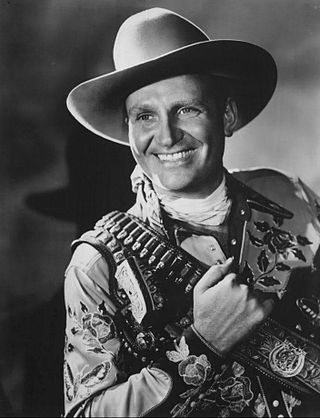
Orvon Grover "Gene" Autry, nicknamed the Singing Cowboy, was an American actor, musician, singer, composer, rodeo performer, and baseball owner, who largely gained fame by singing in a crooning style on radio, in films, and on television for more than three decades, beginning in the early 1930s.
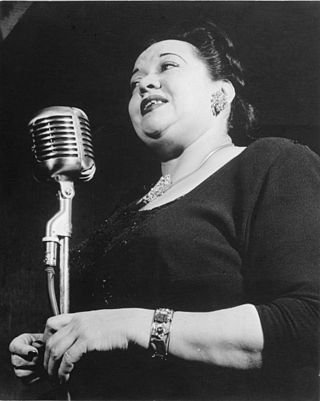
Mildred Bailey was a Native American jazz singer during the 1930s, known as "The Queen of Swing", "The Rockin' Chair Lady" and "Mrs. Swing". She recorded the songs "For Sentimental Reasons", "It's So Peaceful in the Country", "Doin' The Uptown Lowdown", "Trust in Me", "Where Are You?", "I Let a Song Go Out of My Heart", "Small Fry", "Please Be Kind", "Darn That Dream", "Rockin' Chair", "Blame It on My Last Affair", and "Says My Heart". She had three records that reached number one on the popular charts.

"The Yellow Rose of Texas" is a traditional American song dating back to at least the 1850s. Members of the Western Writers of America chose it as one of the Top 100 Western songs of all time. Many versions of the song have been recorded, the most popular of which was by Mitch Miller, whose version reached No. 1 in the United States in 1955. Its popularity made it an unofficial state song of Texas.
"Back in Your Own Backyard" is a popular song. Officially the credits show it as written by Al Jolson, Billy Rose, and Dave Dreyer; in fact, Billy Rose was exclusively a lyricist, Dreyer a composer, and Al Jolson a performer who was often given credits so he could earn some more money, so the actual apportionment of the credits would be likely to be music by Dreyer, lyrics by Rose, and possibly some small contribution by Jolson.
"Thinking of You" is a popular song, composed by Harry Ruby with lyrics by Bert Kalmar. It was introduced in the Broadway show, The Five O'Clock Girl (1927) when it was sung by Mary Eaton and Oscar Shaw.
"Prisoner of Love" is a 1931 popular song, with music by Russ Columbo and Clarence Gaskill and lyrics by Leo Robin.
"The One I Love (Belongs to Somebody Else)" is a popular song composed by Isham Jones with lyrics by Gus Kahn. The song was recorded by Isham Jones' Orchestra on December 21, 1923, at Brunswick Studios in New York City, and published on January 7, 1924. On January 17 in Chicago, Jones recorded another version, with Al Jolson on lead vocals. Both versions made the charts that Spring, with Jolson's peaking at number 2, and Jones' at number 5. Sophie Tucker recorded her version February 1924, released on Okeh 40054.
"Don't Take Your Love from Me" is a popular song written by Henry Nemo and published in 1941. Mildred Bailey first recorded this song in 1940 before publication. It was introduced that year by singer Joan Brooks.

"Somebody Loves Me" is a popular song, with music written by George Gershwin, and lyrics by Ballard MacDonald and Buddy DeSylva. The song was published in 1924 and featured in George White's Scandals of 1924.
"I Gotta Right to Sing the Blues" is a popular song with music by Harold Arlen and lyrics by Ted Koehler, published in 1932 for the Broadway show Earl Carroll's Vanities (1932). The song has become a jazz and blues standard. Popular recordings in 1933 and 1934 were those by Cab Calloway, Louis Armstrong and Benny Goodman.
"Back in the Saddle Again" was the signature song of American cowboy entertainer Gene Autry. It was co-written by Autry with Ray Whitley and first released in 1939. The song was associated with Autry throughout his career and was used as the name of Autry's autobiography in 1976. Members of the Western Writers of America chose it as fifth of the Top 100 Western songs of all time.
"Don't Worry 'Bout Me" is a 1938 song composed by Rube Bloom, with lyrics written by Ted Koehler. It was introduced in the "World's Fair" edition of the Cotton Club show in 1939. The first hit recording was in 1939 by Hal Kemp and His Orchestra.
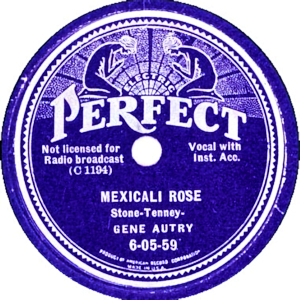
"Mexicali Rose" is a popular song composed by bandleader and pianist Jack Breckenridge Tenney in the early 1920s, when he and his seven piece orchestra played the hotels and clubs of the Calexico and Mexicali border. The song became a hit in the mid-1930s, thanks to Gene Autry and Bing Crosby, around the same time that Tenney became a lawyer and was elected to the California State Assembly. Tenney was later appointed to head of the California Senate Factfinding Subcommittee on Un-American Activities.

"Here Comes Santa Claus (Right Down Santa Claus Lane)" is a popular Christmas song written and originally performed by Gene Autry, with music composed by Oakley Haldeman. Autry's original recording (in which he pronounces Santa Claus as "Santy Claus") was a top-10 hit on the pop and country charts; the song would go on to be covered many times in the subsequent decades.
"San Antonio Rose" is a swing instrumental introduced in late 1938 by Bob Wills and His Texas Playboys. Quickly becoming the band's most popular number, Wills and band members devised lyrics, which were recorded on April 16, 1940, and released on Okeh 5694 in August as "New San Antonio Rose". Despite having completed a lengthy Hillbilly/Folk chart run in 1939, which culminated at #1, it quickly rose to the top again, in early 1941. It went on to become the band's theme song for the next forty years, reverting to its original title.

"Out of Nowhere" is a popular song composed by Johnny Green with lyrics by Edward Heyman and published by Famous Music. It was popularized by Bing Crosby, and was the first recording under his Brunswick Records contract. He recorded it on March 30, 1931 and it became his first number one hit as a solo artist. Crosby also sang it in the film Confessions of a Co-Ed (1931) and in his short film I Surrender Dear (1931). He recorded it again in 1954 for his album Bing: A Musical Autobiography.
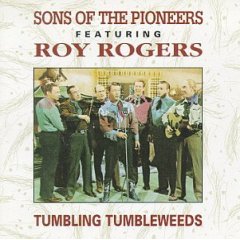
"Tumbling Tumbleweeds" is a Western music song composed by Bob Nolan, a founding member of the Sons of the Pioneers. Nolan wrote the song in the early 1930s while he was working as a caddy and living in Los Angeles. It was first recorded by the Sons of the Pioneers in 1934, and it became one of the most famous songs associated with the group. Originally titled "Tumbling Leaves", the song was reworked into the title "Tumbling Tumbleweeds" and into more widespread fame with the 1935 film of the same name starring Gene Autry. Members of the Western Writers of America chose it as one of the Top 100 Western songs of all time.
"Tomorrow Night" is a 1939 song written by Sam Coslow and Will Grosz. A version by Horace Heidt and His Musical Knights was very popular in 1939.

"Goodbye, Little Darlin', Goodbye" is a 1939 song written by Gene Autry and Johnny Marvin. Autry sang it in the December 1939 movie South of the Border, and released it as a single in April 1940. It went on to make both Popular and Hillbilly (Country) listings for 1940.
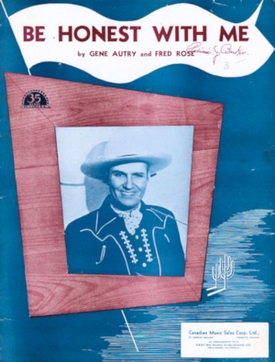
"Be Honest With Me" was a 1940 song by Gene Autry and Fred Rose. The recording by Autry was one of the big Hillbilly hits of 1941, and was nominated for the 1942 Academy Award for Best Original Song.
References
- 1 2 3 "MELOTONE 1936 78rpm numerical listing discography". www.78discography.com. Retrieved 2022-03-02.
- ↑ Library of Congress. Copyright Office. (1936). Catalog of Copyright Entries 1936 Musical Compositions Fine Arts New Series Vol 31 Pt 3 For the Year 1936. United States Copyright Office. U.S. Govt. Print. Off.
- ↑ "Frank Walker". Variety. December 21, 1938. p. 24. Retrieved June 18, 2022.
- ↑ "The Online Discographical Project". 78discography.com. Retrieved February 20, 2019.
- ↑ "The Online Discographical Project". 78discography.com. Retrieved February 20, 2019.
- ↑ "The Online Discographical Project". 78discography.com. Retrieved February 20, 2019.